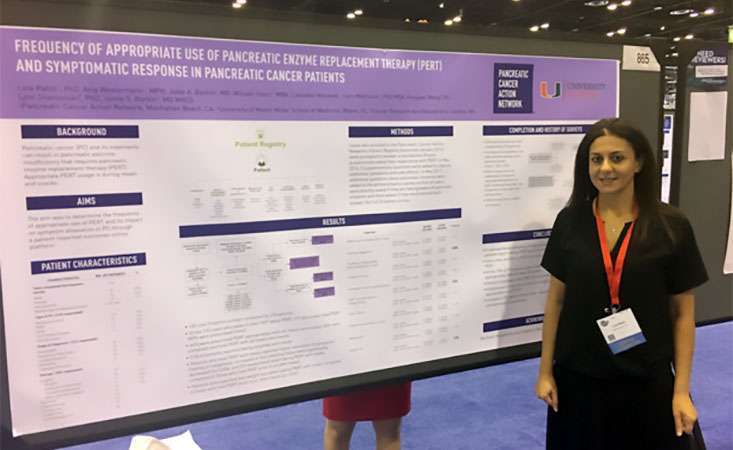
The symptoms patients may experience leading up to their pancreatic cancer diagnosis – including weight loss, abdominal pain and changes in stool – can persist during and after treatment. In addition, surgery for pancreatic cancer can induce or worsen these symptoms.
The culprit? An insufficiency of pancreatic enzymes.
“When someone’s pancreas doesn’t produce the appropriate enzymes, they can’t digest food properly,” explained Lola Rahib, PhD, researcher with the Pancreatic Cancer Action Network (PanCAN). “The symptoms can be very debilitating and can dramatically affect their quality of life.
“But, these symptoms can be alleviated by replacing the missing enzymes through a pill, prescribed by a healthcare professional.”
Rahib and others at PanCAN, along with collaborators from the University of Miami and biostatisticians from Cancer Research And Biostatistics (CRAB), published a paper in the journal Pancreas describing how appropriate use of pancreatic enzymes can make patients living with pancreatic cancer feel much better.
The data were gathered through PanCAN’s Patient Registry from January 2016 to January 2018. The Patient Registry is a global online database created to look for patterns in treatments, side effect management and diagnostics that will lead to improved treatment options and outcomes for patients.
With preliminary information previously presented at major conferences in October and November 2017, the paper describes how frequently patients discuss enzymes with their healthcare team, whether and how enzymes are prescribed – and whether patients take the enzymes appropriately.
Within the Patient Registry, participants were given two opportunities to provide information about enzymes use. First, all registry participants are asked to fill out basic questions about their diagnosis and health status. Within this section, 258 users answered enzymes-specific questions.
Of these users, nearly half reported taking enzymes, while 27 percent reported being unaware of enzymes. The remaining users were either aware of enzymes but hadn’t taken them, or they had taken enzymes in the past but weren’t currently taking them.

Lola Rahib, PhD, presented PanCAN Patient Registry data about pancreatic enzyme use at the 2017 World Congress of Gastroenterology meeting.
“We added enzymes-related questions to the list of basic questions in the registry in May 2017 in order to get responses from a wider patient population, including individuals who weren’t currently taking the medication or who hadn’t discussed it with their healthcare team,” Rahib said.
“We were alarmed to learn that 27 percent of users hadn’t even heard of enzymes.”
Good nutritional care improves outcomes and is critical for quality of life. PanCAN strongly recommends that patients have access to pancreatic enzymes and see a registered dietitian.
Contact PanCAN Patient Services for comprehensive disease information, including a copy of our diet and nutrition booklet, nutrition tips and recipes, and help finding a registered dietitian in your area.
A different section completely devoted to enzyme prescription and use gave Patient Registry participants a second opportunity to share their detailed experiences. In this section, 235 users reported discussing enzymes with their healthcare providers, and 89 percent of them had been prescribed the pills.
Surprisingly, their responses revealed that patients were prescribed enzymes from different members of their healthcare team: patients reported receiving the prescription from their medical oncologist, surgeon, gastroenterologist or other healthcare professionals.
“This inconsistency increases the chances that patients will ‘fall through the cracks,’ and some may not receive information about enzymes at all,” Rahib said.
In addition, evidence suggests there are optimal doses of enzymes to alleviate patients’ symptoms, and enzymes are most effective when they’re taken with meals and snacks. Correct use of enzymes can help alleviate symptoms like indigestion and weight loss.
The Supportive Care Committee of PanCAN’s Precision PromiseSM adaptive clinical trial platform recently published categories and interventions for various types of pancreatic cancer-associated weight loss. Their recommendations include enzyme replacement therapy for patients whose weight loss was caused by malabsorption, which is an inability to digest and/or absorb nutrients from food.
“Weight loss experienced by patients with pancreatic cancer can decrease patients’ ability to tolerate treatment, affect their overall quality of life and even impact short- and long-term survival,” Rahib noted.
But, the Patient Registry data showed that not all patients with pancreatic cancer are being prescribed enzymes correctly – and when they are prescribed correctly, not all patients are following their doctors’ instructions.
Of the 205 users who were prescribed enzymes and provided answers about their prescription, only 66 percent were instructed to take the appropriate dose at the appropriate time. Between incorrect prescription and patients’ lack of compliance with doctors’ instructions, about half the patients reported taking the medication incorrectly.
Patients who took the full dose of enzymes with meals and snacks reported significant improvement of symptoms like indigestion and changes in stool, as well as less weight loss, compared to patients who incorrectly took the medication.
“We hope these findings bring awareness to the gaps in care for pancreatic cancer patients and help ensure they are able to receive the necessary medication to alleviate their symptoms and allow them to maintain a healthy weight and lifestyle,” Rahib said. “It is critical for patients, caregivers and healthcare providers to both be aware of pancreatic enzymes and know their appropriate use.”
She added, “We’re extremely grateful to patients and caregivers who took the time to participate in our Patient Registry. Thanks to your willingness, we’re able to establish and disseminate best practices to help patients feel better and, hopefully, live longer.”














